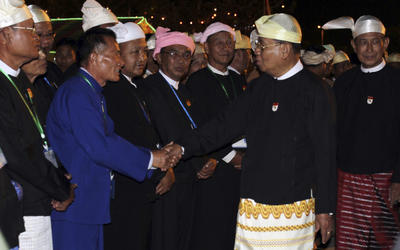This leaves us wondering whether lifting these sanctions could feasibly improve the situation for people in Burma, or conversely, merely allow existing power-holders more business opportunities. While the recent elections, as well as the release of pro-democracy advocate and Nobel Peace Prize laureate Daw Aung San Suu Kyi, has been considered by some, particularly representatives from Thailand, to be sufficient grounds to show that Burma is on its way to reform, other groups, especially the US, are not so eager to lift sanctions.
The US first officially imposed sanctions in 1993, followed by the European Union, Australia and New Zealand, and President Barack Obama renewed its position in 2009. The impetus for sanctions came from international pressure regarding the country’s appalling human rights record, which includes forced relocations, imprisonment of political dissenters, rape, torture, as well as the regime’s refusal to transfer power to the democratically-elected National League for Democracy in 1990. Recently following the 2011 ASEAN call to lift sanctions, Kurt Campbell, the assistant to the Secretary of State visited Southeast Asia. After consulting with ASEAN representatives, he claimed that lifting the sanctions would be ‘obviously premature.’ Arguably, the recent political changes in Burma are only superficial while other more serious issues persist. Especially in the periphery, there is evidence that the Burma Army seeks not only to increase its forces, but also to clamp down on the power of non-state militias in the area.
Following the regime changes in 1989, and the country’s opening up toward outside investment former peripheral militias, re-configured as Nyein Chan Yay Apwe (Ceasefire Groups) have become massively wealthy, coinciding also with business support from neighbouring China. This was a regional trend, also exemplified by the former Thai Prime Minister Chatchai Choonhavan’s oft-quoted 1989 agenda to turn Indochina ‘from a battlefield into a marketplace.’ Depending on the regime, Thailand has oscillated regarding its policy regarding economic engagement with its Western neighbour, with investment and cooperation stepped up during the years of Thaksin Shinawatra’s prime-ministership. Perhaps not so surprisingly, China, Thailand, and Singapore refused to join in sanctions against Burma. It is these countries, as well, upon which the Naypyidaw principally depends for foreign income.
The lifting of sanctions, obviously, would facilitate more foreign investment and business in the country and open the country to a broader market. While the government and its closely-affiliated private cronies constitute the major employers in the country, lifting of sanctions has the potential to allow for people to advocate for reform without immediately being concerned about their source of income. However, so long as the United States is basing its stance on political reasons, the likelihood that the country will lift its sanctions is slim. ASEAN and China, however, even prior to the 2010 elections, have demonstrated that they are willing to engage with the Naypyidaw regime regardless.
Dr Jane Ferguson is a Lecturer in the School of Culture, History & Language in the College of Asia & the Pacific at the Australian National University.


Visiting Myanmar you realise the sanctions are really dumb. They benefit the rich who are the ones sourcing goods from across the border in China and Thailand while hurting the poor on a very large scale by making goods more expesive. Meanwhile the regime is no closer to collapsing economically (the jeet has appreciated something like 25% against the dollar over the past year).
On a recent visit I saw a Mercedes Benz having to slowdown for bullocks outside a palm whsiky factory that was relying on bullock and fire power to produce it’s wonderful product. The helmets used by motorbike drivers in Bagan and the Shan state are antiquated ones from WWII (it’s not uncommon to see a man in a longjii or a Mon woman in full dress to be wearing a Luftwaffe helmet). The motors used on Inle Lake are also from a bygone era (I spotted at least one diesel engine with a Nazi logo which I’d guess they stopped producing in 1945). My guide told me his mother had recently passed away from Malaria as there was no medication available (though that is as much the state’s fault as the sanctions). The only people being punished by the sanctions are the poor. The rich can still get all they need from border towns flush with goods from China and Thailand. It’s very hard to understand the logic behind the current sanction regime.
In my view, sanctions have negative effects for both people in Myanmar as well as to some extent on foreign investors. Even though a country is isolated or sanctioned, it also has some other friends and several available ways to continue for trading which is probably not benefiting to the people especially poor in Myanmar. I do not understand why some want to post sanctions on Myanmar or they want to see Myanmar people poorer. In addition, I do not believe that imposing sanctions can change the situations in Myanmar. I am also surprised that those people still do not understand or pretend they do not understand how to approach or to advocate or deal with the regime / current government in Myanmar. I feel that those who want to impose sanctions or some other policies strategically on Myanmar having been serving their own interests during last 2 decades, rather than benefiting the people of Myanmar, and they are actually making my country worse off. I believe that imposing sanctions is a kind of pushing the government to go another way, which will lead to disparities between rich and poor, an increase in inequalities and it will definitely impact on poor people in Myanmar. However, the government will go on the way that they intend, I think people still do not understand how clever they are. In my opinion, there should be incentives to change things ….otherwise ?